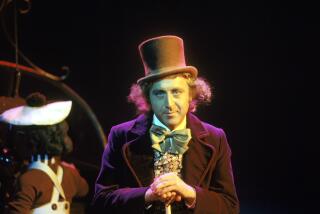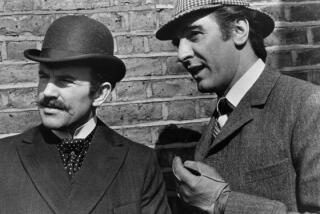On Laser: Case of Missing ‘Holmes’ Footage
- Share via
It would be wonderful to report that the Image Entertainment release of Billy Wilder’s “The Private Life of Sherlock Holmes” ($60) is the 1970 film as the co-writer/director originally intended it.
Alas, it is not. But it is as close as we are likely to come in the foreseeable future, unless Holmes himself unearths the original roadshow edition shot by the fabled director but never released by United Artists.
What Image’s laser wizards have done, however, is reassemble as closely as possible a glimpse of what might have been had the studio kept faith with the director of “Some Like It Hot” and “Sunset Boulevard.”
The original “Private Life . . . ,” written by Wilder and longtime collaborator I.A.L. Diamond, was a two-hour, 45-minute exploration of the previously untold private life of Arthur Conan Doyle’s legendary master of deductive reasoning. Wilder said that he designed the film as a symphony in four movements, structured around a prologue in which Dr. Watson’s grandson discovers four of his grandfather’s unpublished stories from 221-B Baker St.
One of many road-show films that dotted the late ‘60s to lure “Laugh-In” and “Welby” couch potatoes into theaters for “event” movies, it had the misfortune to follow several failed events (“Star!,” “Paint Your Wagon”), and so the studio hacked it down to two hours and five minutes.
What was trimmed was the prologue and two cases that helped reveal what Wilder intended as “a serious study of Holmes,” an attempt to explain the cerebral, ascetic “dope addict” and “misogynist.” Starring as Holmes is Robert Stephens (Wilder’s original choice was Peter O’Toole) and Colin Blakely (Peter Sellers was the original choice for the good doctor).
The missing elements are diabolically frustrating. First, the producers of the two-disc laser found the video of the missing “The Dreadful Business of the Naked Honeymooners” but not the audio track. The clever reconstruction includes the video with subtitled dialogue from one of the found original scripts. As such, it’s a chance for true interactivity for aspiring thespians and Holmes fans: Just assign the parts to viewers in your living room.
Then, the producers found only the audio of the second missing sequence, “The Curious Case of the Upside Down Room.” No video was ever found. The audio alone is wonderfully effective, like listening to an old radio program.
All in all, the missing pieces seem to come together to give us more than a hint of what Wilder originally had in mind.
The film itself, in a sharp digital film transfer using the original 2.35:1 Panavision aspect ratio (annoying to those who hate large black borders and narrow video), is an enjoyable piece of work even in its abbreviated version.
The atmospheric Miklos Rozsa score can be heard without dialogue and sound effects since it has been isolated on the right digital and analog tracks. Music cue sheets also are included. Excellent liner notes detail Wilder’s vision, from writing the film itself to using Rozsa’s passionate Violin Concerto, Opus 24. The concerto, originally written for Jascha Heifitz, ultimately served as the skeleton around which the movie was fleshed out.
Laserbits
New Movies Just Out: “The Piano” (LIVE, letterboxed, $40); “The Remains of the Day” (Columbia TriStar, $40); “Short Cuts” (New Line, $50); “The Joy Luck Club” (Hollywood/Image Entertainment, letterboxed, $40); “A Dangerous Woman” (MCA/Universal, $35).
Coming Soon: Paramount’s “Wayne’s World 2” with Dana Carvey and Mike Myers is due Wednesday; Columbia TriStar’s “Rudy,” starring Sean Astin, is scheduled for June 22, at $35; Buena Vista’s “Aladdin,” released through Image Entertainment, will be released Sept. 21, at $30, with a letterboxed THX special edition going for $50; “Tim Burton’s Nightmare Before Christmas,” also on Image, will be released Nov. 16, at $30 and in a $100 collector’s edition.
More to Read
Only good movies
Get the Indie Focus newsletter, Mark Olsen's weekly guide to the world of cinema.
You may occasionally receive promotional content from the Los Angeles Times.










